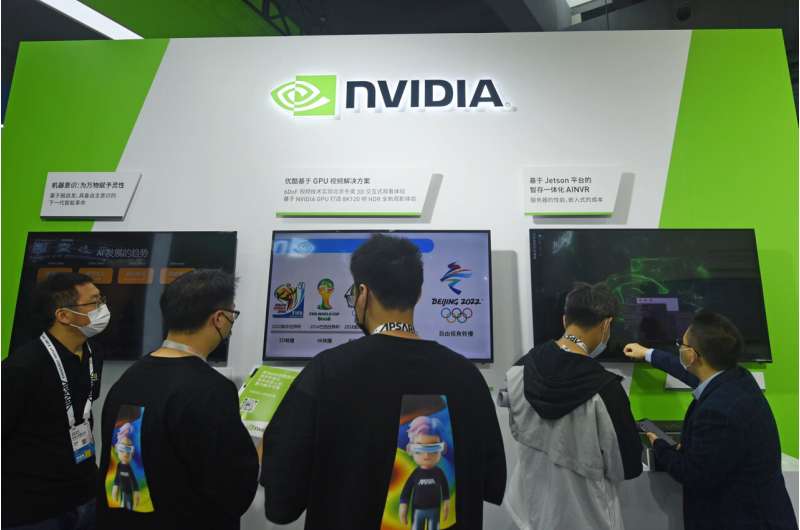Visitors stop by the booth of Nvidia at the Apsara Conference, an annual cloud service technology forum hosted by Alibaba Group, in Hangzhou in eastern China's Zhejiang province Tuesday, Oct. 19, 2021. The Chinese government on Thursday, Sept. 1, 2022, called on Washington to repeal its technology export curbs after chip designer Nvidia Corp. said a new product might be delayed and some work might be moved out of China. Credit: Chinatopix Via AP
The Chinese government on Thursday called on Washington to repeal its technology export curbs after California-based chip designer Nvidia said a new product might be delayed and some work might be moved out of China.
The latest controls add to mounting U.S.-Chinese tension over technology and security. American officials say they need to limit the spread of technology that can be used to make weapons.
Nvidia said it was told last week it needs a U.S. government license to export any product with performance equal to its A100 graphics processing chips or better to China, Hong Kong or Russia. It said buyers of the A100, and development of the newer H100, might be affected.
But in an amended disclosure Thursday to U.S. securities regulators, the company said the U.S. government was offering some reprieve by authorizing certain chip exports that will enable Nvidia to keep supplying them to American customers through March.
The high-end chips are designed to help power data centers and run artificial intelligence applications. The restrictions don't affect Nvidia's better-known products used in video games and automotive technology.
Another U.S. chipmaker, Advanced Micro Devices, said Friday it had also received new licensing requirements from the U.S. Department of Commerce blocking the shipment of some of its high-end graphics processors to China and Russia. But AMD said it was unlikely to cause product-development delays or have a material impact on its business.
China's Commerce Ministry accused Washington of abusing export controls to limit semiconductor sales to China. It said trade curbs would disrupt supply chains and global economic recovery.
"China firmly opposes this," said a ministry spokesperson, Shu Jueting. "The U.S. side should immediately stop its erroneous practices, treat companies from all countries equally, including from China, and do more to contribute to world economic stability."
U.S. officials increasingly worry about Chinese technology development as both a strategic threat and a potential challenge to American industrial leadership.
Washington has tightened controls and lobbied allies to limit Chinese access to the most advanced chips and tools to develop its own. China is spending heavily to develop its fledgling producers but cannot make high-end chips used in the most advanced smartphones and other devices.
In a earlier disclosure Wednesday, Nvidia said it may be required to "transition certain operations out of China." The company said it was asking the U.S. government for exemptions for its development and support activities.
It said it would try to meet Chinese customer needs with products that aren't subject to license requirements. It said the company may seek a license for customers that need them but "has no assurance" the U.S. government will agree.
Shares in Nvidia Corp., which is based in Santa Clara, California, lost $11.57, or almost 8%, to close Thursday at $139.37.
© 2022 The Associated Press. All rights reserved. This material may not be published, broadcast, rewritten or redistributed without permission.
























